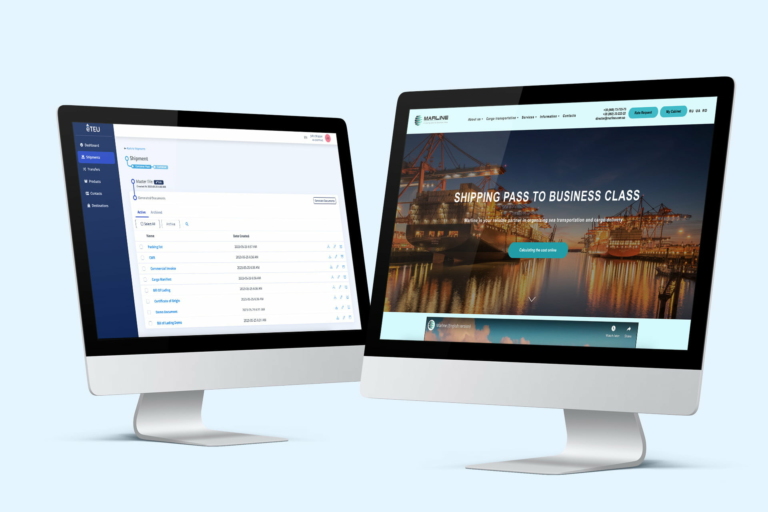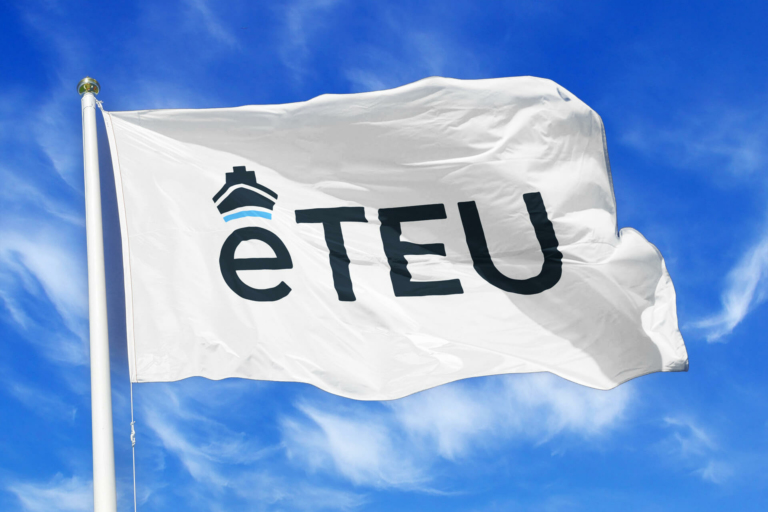Introduction:
This use case will focus on describing the pilot and its results. It is worth noting that an NDA was signed with the shipping line (for this specific use case we will call it Shipping Line A), thus its name will not be described in the document itself, however the details of the freight forwarder that eTEU worked with during the pilot are publicly available. The structure of this use case is split into 4 parts. Firstly, the challenge describes the difficulties and issues that the shipping line and the freight forwarder Marline have been facing in their work. Secondly, the solution segment focuses on pointing out how the eTEU platform was used during the shipping process. Thirdly, the results section goes over the benefits that were drawn out of using the eTEU platform, and how that affected both sides of the shipment. Finally, the conclusion will tie everything together.
Challenge:
Shipping Line A is a major player in the container shipping industry, ranked among the top 5 largest shipping lines globally. The company prides itself on delivering reliable, efficient, and cost-effective shipping solutions to its customers. However, like many others in the industry, Shipping Line A faced a common challenge in its shipping process: the use of paper bills of lading (BL).
Traditionally, paper BLs have been the standard method for documenting the ownership and transfer of goods in international trade. They play a vital role in proving the title of goods, facilitating trade finance, and clearing customs. Unfortunately, paper BLs also come with several drawbacks. They are cumbersome, time-consuming, and susceptible to errors and fraud. They require a significant amount of administrative work, including printing, signing, stamping, and couriering documents from one party to another. Additionally, they take a long time to transfer, leading to delays and demurrage charges.
To address these issues, Shipping Line A sought a solution that would enable them to issue and transfer electronic bills of lading (eBLs) securely and efficiently, without compromising on the legal validity and functionality of the document. Moreover, they aimed to offer their customers a better service and experience by providing instant access to their eBLs online.
On the other side of this case study is Marline, a medium-sized freight forwarding company that wanted to test the potential of an eBL solution. However, most providers in the market charged exorbitant fees, making it difficult for Marline to enter the market. The company was eager to improve its customer service and streamline shipment administration, a goal that could only be achieved through innovation. Customer service is often directly affected by the number of hours dedicated to individual customers, so Marline needed a solution that would free up time and resources.
Enter eTEU, a startup that aims to revolutionise the global container shipping industry by offering a secure, efficient, and cost-effective solution for eBLs. With eTEU, shipping carriers and freight forwarding companies can issue, transfer, and store eBLs securely and efficiently, without the need for paper documents. This results in significant cost savings, as eBLs eliminate the need for printing, couriering, and storing physical documents. Moreover, eTEU’s platform enables instant access to eBLs, thus reducing the time it takes to transfer goods and minimising the risk of delays and demurrage charges.
Overall, eTEU’s innovative eBL solution offers a significant improvement over traditional paper bills of lading. Its user-friendly platform provides a cost-effective, secure, and streamlined alternative that benefits both shipping carriers and freight forwarding companies. By partnering with eTEU, businesses can improve their operational efficiency, reduce costs, and enhance their customer service, thus gaining a competitive advantage in the global container shipping industry.
Solution:
Shipping Line A tested and implemented eTEU, an eBL platform, as a solution to their paper bill of lading challenges. With eTEU, users can easily create, manage and track the status of their eBLs in real-time through a web browser. eTEU is built on DCSA eBL Interoperability Standards, ensuring seamless and secure exchange of eBLs issued by different platforms.
To test the effectiveness of eTEU, Shipping Line A conducted a trial with Marline, a medium-sized freight forwarding company, for a shipment of titanium sponges worth 200,000 USD from Ukraine to Japan. Both paper BL and eBL by eTEU platform were used in parallel for the shipment, and the results were compared. This allowed Shipping Line A to confirm the reliability, security, and functionality of eTEU as a valid alternative to traditional paper bills of lading.
The Result:
The trial demonstrated that using eTEU Platform was highly beneficial for both the Shipping Line and freight forwarder, resulting in significant advantages over paper-based Bill of Lading (BL) processes. Specifically, using eTEU Platform offered several advantages:
- Cost savings: The cost of transfer per eBL using eTEU Platform was only 1 USD compared to 72 USD for paper BL. This includes the costs of printing, couriering, handling, and storage of the documents.
- Time efficiency: The eTEU Platform significantly reduced the time spent on administrative tasks, with an average of 1 hour per shipment compared to 7 hours per shipment for paper BL. This includes the time spent on drawing up documents, getting signatures and stamps from various parties, delivering documents from one office to another, and mailing documents overseas.
- Speed of transfer: Using eTEU Platform, the transfer of eBLs takes less than a minute per transfer, while it takes 8 days for paper BL to reach the destination country by courier or mail.
The use of eTEU Platform not only saved time, money, and resources, but also improved security and transparency. The parties involved could access their eBLs instantly online from any smart device without any concerns about losing, damaging, or tampering with the documents. Additionally, they could track the status of their eBLs at any time and make amendments or replacements easily if required.
Using eTEU Platform also had a positive impact on customer satisfaction, as shippers were pleased to see their documents arrive at the destination without any delay. The customers were able to receive their eBLs faster and more conveniently than paper BLs.
Marline, the freight forwarder, benefited from using eTEU Platform as they didn’t have to travel to the Shipping Line’s office or mail paper BLs to their client’s office, which was located in a different city. Similarly, their client did not have to go to the post office to mail the paper BLs overseas. All these tasks could be completed online using eTEU Platform.
For the shipper, who was the original owner of the cargo of titanium sponge, using eTEU Platform meant that they did not have to pay for mailing fees or wait for days for their paper BLs to arrive. They could receive their eBLs instantly online using eTEU Platform, and they were also able to use their eBLs as collateral for trade finance or insurance if needed.
Conclusion:
In conclusion, eTEU Platform offers a wide range of benefits for both Shipping Lines and their customers. By using eBLs, Freight forwarders, shippers, and Shipping lines can enjoy:
- Reduced costs and risks: With eBLs, the cost of transfer reduces significantly from $72 for paper BLs to just $1 per eTEU eBL. This includes the costs of printing, couriering, handling, and storage of the documents. Additionally, eBLs reduce the risks of loss, damage, and tampering, as the documents are stored securely online.
- Faster and easier document transfer: eTEU Platform reduces the time spent on administrative tasks from 7 hours per shipment for paper BLs to just 1 hour per shipment. This includes the time spent on drawing up documents, getting signatures and stamps from various parties, delivering documents from one office to another, and mailing documents overseas. With eTEU Platform, the transfer of the document takes less than 1 minute per eBL, compared to 8 days for paper BLs.
- Enhanced security and transparency: eTEU Platform offers enhanced security and transparency features, such as real-time tracking, audit trails, and secure storage, which allow for easy verification of authenticity and help prevent fraud.
- Improved customer service and experience: eTEU Platform has a positive effect on customer satisfaction, as shippers and their customers can access their eBLs instantly online via any smart device, without having to worry about delays in mailing or lost documents. It also enables easier amendments and replacements if needed.
- Increased trade opportunities and flexibility: eTEU Platform allows for easier collateralization of eBLs for trade finance or insurance, and provides more flexibility for the negotiation of sales contracts and shipping arrangements.
Overall, eTEU Platform is the best eBL solution for SMEs, as it offers unbeatable pricing and unmatched simplicity of adoption. With just a few minutes to create an account and invite trade counterparts, eTEU Platform is the ultimate way to simplify, streamline, and secure the shipping process.


